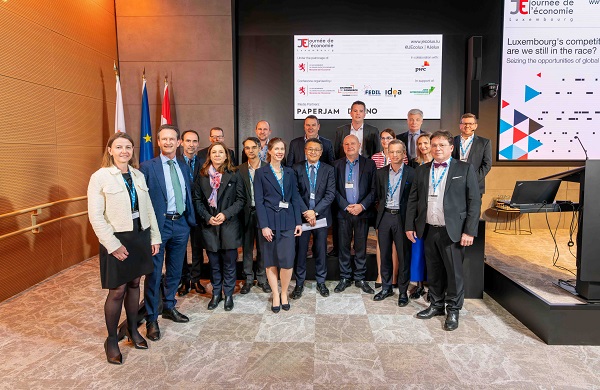 Credit: PwC Luxembourg
Credit: PwC Luxembourg
The seventeenth "Journée de l’Economie" (Day of the Economy) took place at the Luxembourg Chamber of Commerce on Tuesday 26 March 2024.
In the presence of Luxembourg's Minister of the Economy, Lex Delles, and with keynote speeches by Lionel Fontagné, Michele Cincera and Serge Allegrezza, over 190 participants discussed the theme "Luxembourg's competitiveness: are we still in the race? Seizing the opportunities of global change". Two panel discussions enriched the programme and allowed the visitors to raise their questions.
The organisers behind this event were Luxembourg's Ministry of the Economy, the Luxembourg Chamber of Commerce, FEDIL and Fondation IDEA, in collaboration with PwC Luxembourg.
While last year's edition of the Journée de l'Economie was more focused on geopolitical shifts and threats and their consequences on the global economy, this year's dominating topics were related to Luxembourg's current competitiveness, identifying the critical success factors from recent years and defining their role in shaping the Grand Duchy's trajectory for the future. As reported by PwC Luxembourg, the discussion also endeavoured to explore innovation and emerging technologies in Luxembourg, investigating the country's role in shaping tomorrow's technological landscape while tackling the challenges of environmental and digital transformation.
Participants were welcomed by Serge Allegrezza, Director of STATEC, who underlined the Journée de L'Economie's seventeen-year history and reminded the audience of previous themes such as corporate social responsibility (CSR), pandemics and geopolitical challenges, among others. Mr Allegrezza also stressed how, during the past three years, the competitiveness of Luxembourg was impacted by the pandemic, the energy crisis and the war in Ukraine.
In his opening remarks, Carlo Thelen, Director General at the Luxembourg Chamber of Commerce, reminded attendees that Luxembourg has maintained a relatively high level of economic prosperity thus far, and that "the resilience capabilities of Luxembourg during the pandemic and the confirmation of the triple A rating in 2023 are very important elements of the country’s competitiveness". However, Mr Thelen pointed out that this competitiveness has been deteriorating for several years with a significant drop over the last two years in business confidence across several sectors as reflected by the Luxembourg Chamber of Commerce's latest Economic Barometer.
Mr Thelen added: "In a fast-changing environment whereby national resources are scarce, the time has come to create a new and more resilient model", based on a dynamic energy transition and further diversification. He emphasised two concerning points, namely, research and development (R&D) intensity (Luxembourg R&D spending represented less than 1% of GDP in 2022) and the stagnation of labour productivity. He reminded the audience that innovation, the promotion of entrepreneurial spirit, high quality in scientific and technological infrastructure and attraction of talents are all crucial for the country's future. He concluded that it will take courage and vision to maintain and increase the competitiveness of the economy, a sentiment echoed throughout the day.
Economy Minister Lex Delles spoke about the importance of competitiveness in his political agenda. He described productivity as the key element of Luxembourg's economic development and that which sustains the country's socio-economic model. He also highlighted the need for action in several areas, including R&D, innovation, digitalisation, skill retention and the softening of the regulatory framework. He said his ministry is actively working on measures to promote technological progress within companies. Minister Delles concluded that Luxembourg's competitiveness remains high despite a recent slight decline, with strengths including macroeconomic and political stability, a triple A rating, a favourable business environment and a satisfactory regulatory framework. As for areas for improvement, he cited the costs of labour, inflation, management practices and slow productivity growth.
Professor Lionel Fontagné of the University Paris I Panthéon-Sorbonne and the Paris School of Economics spoke about the future of competitiveness and the energy transition. He highlighted the importance of considering the indicators that make up global rankings, such as the price of energy, and the challenge of collective action in discussing the energy transition between civil society and the government. He also emphasised the heterogeneity of ambitions and instruments among countries that signed the Paris agreement on climate change, leading to distorted competition at the international level. He proposed the possible solution of an implicit price of carbon that would rely on a model, raising the question of which model should be considered for that purpose.
Before the break, there was a panel of five keynote speakers, who shared their insights on the country's competitiveness in the face of fierce competition and unfavourable market conditions.
The final discussion of the day was moderated by Cécile Liégeois, Partner, Clients & Markets Leader at PwC Luxembourg, and Gaston Trauffler, Head of Industrial Policy at FEDIL. They were joined by Emilie Allaert, founder and CEO of Digital Minds Sàrl, Michele Cincera, Professor of Economics at Solvay Brussels School of Economics and Management-ULB, Anne-Marie Solvi, CEO of Paul Wurth Geprolux SA, Christophe Timmermans, CEO of SolarCleano, and Pierre Zimmer, CIO at POST, for a discussion on innovation and technological future in Luxembourg, shedding light on the challenges and strategies required to uphold Luxembourg's competitiveness.
As is tradition, 100% of registration proceeds will be donated to a non-profit organisation. This years' proceeds, of about €6,000, will be given to Jonk Entrepreneuren Luxembourg (JEL).








